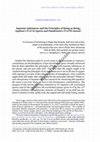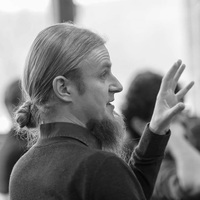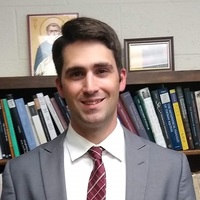Published Articles by Philip-Neri Reese, O.P.
Summa metaphysicae ad mentem sancti Thomae: Essays in Honor of John F. Wippel, 2024
This contribution in honor of the life, work, and teaching of Fr. Wippel aims to show that the ar... more This contribution in honor of the life, work, and teaching of Fr. Wippel aims to show that the argument Aquinas gives in ST I.44.1 ad 1 for the conclusion that all beings are created is a genuinely propter quid metaphysical argument.
Nova et Vetera, 2024
In this paper I weigh in on the ongoing Thomistic debate between corruptionists, survivalists, an... more In this paper I weigh in on the ongoing Thomistic debate between corruptionists, survivalists, and incompletionists about whether the soul's separate, post-mortem existence suffices for my post-mortem existence.
Religions, 2024
One of the most influential and controversial schools of 20th century Thomism—especially in North... more One of the most influential and controversial schools of 20th century Thomism—especially in North America—is the “River Forest School” or “River Forest Thomism”. And one of the most influential and controversial theses associated with that school is the thesis that metaphysics cannot be established as a distinct and autonomous science unless one has already proven the existence of a positively immaterial being. The purpose of this paper is to show that River Forest Thomism cannot and should not be reduced to that controversial thesis. As such, rejection of the thesis cannot and should not constitute a rejection of the school. Indeed, as soon as we understand what River Forest Thomism was really about, it will become clear that all Thomists should be River Forest Thomists.
Asian Journal of Philosophy, 2023
The purpose of this article is to express what I call a “conciliar concern” regarding Jc Beall’s ... more The purpose of this article is to express what I call a “conciliar concern” regarding Jc Beall’s recently proposed contradictory Christology. By “conciliar concern” I mean a concern that is likely to be shared by all Christians—be they Catholic, Orthodox, or Protestant—who are committed to the early ecumenical councils. Formulated as an argument, the concern is this: if contradictory Christology is correct, then the early ecumenical councils were misguided. But (conciliar Christians should say that) the early ecumenical councils were not misguided. Therefore, (conciliar Christians should say that) contradictory Christology is not correct.

Documenti e studi sulla tradizione filosofica medievale, 2020
This article draws attention to an oft-overlooked puzzle arising from Thomas Aquinas’s account of... more This article draws attention to an oft-overlooked puzzle arising from Thomas Aquinas’s account of the principles of metaphysics, and an even more oft-overlooked answer found in the work of the 15th century metaphysician, Dominic of Flanders. §1 provides an account of Aquinas’s aporia, which arises from the fact that he holds, on the one hand, that created separate substances are among the principles of being qua being, and, on the other hand, that created separate substances fall under being qua being. §2 defends the genuineness of this aporia with a detailed analysis of the prooemium to Aquinas’s Metaphysics commentary. Finally, §3 shows how Dominic of Flanders resolves this aporia with an account of the role of separate substances as celestial movers that renders them not only cosmological principles of change, but also ontological principles of being.
American Catholic Philosophical Quarterly, 2016
This article investigates an aporia in the metaphysical thought of John Duns Scotus. On the one h... more This article investigates an aporia in the metaphysical thought of John Duns Scotus. On the one hand, there are strong textual grounds for saying that according to Scotus the subject matter of metaphysics excludes logical being. On this reading, metaphysics would be a transcendental, but not a supertranscendental, science. On the other hand, there are strong textual grounds for saying that according to Scotus the subject matter of metaphysics includes logical being. On this reading, metaphysics would be a supertranscendental, and not just a transcendental, science. Two possible paths for resolving this aporia are considered and subsequently problematized. The aporia seems to be genuine, and recognition of this fact brings into sharper focus the position of Scotus’s metaphysics in the development of supertranscendental thought.
Journal of Markets & Morality, 2015
Although Murray Rothbard gave high praise to the economic teachings of Thomas de Vio Cardinal Caj... more Although Murray Rothbard gave high praise to the economic teachings of Thomas de Vio Cardinal Cajetan, portraying him as proto-Austrian, this article argues that the reality is more complicated. Examining Cajetan’s three major economic works, On Monetary Exchange, On Charitable Pawnshops, and On Usury, it demonstrates that he could be in turn liberal, moderate, and conservative, depending on the particular context and question. It concludes that read within his own scholastic and pastoral approach, Cajetan may still have insights and contributions to offer the history of economics, but of a more mixed character than Rothbard’s portrayal.
New Blackfriars, May 2014
Capitalizing on the diversity of ways in which the phrase “the end of ethics” can be interpreted,... more Capitalizing on the diversity of ways in which the phrase “the end of ethics” can be interpreted, this article explores how, from a Thomistic perspective, the virtue of prudence might be considered the “end” of ethics. After bringing to light certain problematic aspects of the relationship between ethics and prudence, it is argued that Aquinas’ understanding of the intellectual virtues allows for a clear line to be drawn between the two. In this way, it is possible to say where ethics “ends” and prudence begins. This answer, however, seems to raise a further difficulty which, upon resolution, reveals a sense in which prudence is also the “end” of ethics when “end” is taken to mean its goal.

New Blackfriars, Nov 2011
The issue of hyper-specialization within the various academic fields has often been raised in the... more The issue of hyper-specialization within the various academic fields has often been raised in the context of recent discussions concerning the purpose or end of the modern university. Theology, one such field in which continual specialization seems prevalent, is further complicated by questions regarding the relationship between faith and the scientific character of theology, as well as the role of the university with regard to that relationship. Though seemingly diverse, a resolution to both of these questions may be found by giving an account of how the sciences, like theology, are specified. It is the purpose of the present article to explore the classical Thomistic position on this subject, and to apply its principles to the case of theology. It is shown that the specification of a science can be understood in terms of both the “formal object which” is known in a given science and the “formal object under which” it is known. The former can provide a correct starting point for managing the multiplicity of “sub-fields” and various specializations within the science of theology, while the latter can help to answer the question of the interrelation between faith and theology as a science in a university setting.
Book Reviews by Philip-Neri Reese, O.P.
The Review of Metaphysics, 2022
Medievalia et Humanistica, 2011
Papers by Philip-Neri Reese, O.P.
Religions, Apr 30, 2024
One of the most influential and controversial schools of 20th century Thomism-especially in North... more One of the most influential and controversial schools of 20th century Thomism-especially in North America-is the "River Forest School" or "River Forest Thomism". And one of the most influential and controversial theses associated with that school is the thesis that metaphysics cannot be established as a distinct and autonomous science unless one has already proven the existence of a positively immaterial being. The purpose of this paper is to show that River Forest Thomism cannot and should not be reduced to that controversial thesis. As such, rejection of the thesis cannot and should not constitute a rejection of the school. Indeed, as soon as we understand what River Forest Thomism was really about, it will become clear that all Thomists should be River Forest Thomists.
Review of Metaphysics, Sep 1, 2022
The Review of Metaphysics
Asian Journal of Philosophy
The purpose of this article is to express what I call a "conciliar concern" regarding Jc Beall's ... more The purpose of this article is to express what I call a "conciliar concern" regarding Jc Beall's recently proposed contradictory Christology. By "conciliar concern" I mean a concern that is likely to be shared by all Christians-be they Catholic, Orthodox, or Protestant-who are committed to the early ecumenical councils. Formulated as an argument, the concern is this: if contradictory Christology is correct, then the early ecumenical councils were misguided. But (conciliar Christians should say that) the early ecumenical councils were not misguided. Therefore, (conciliar Christians should say that) contradictory Christology is not correct.

New Blackfriars, 2011
The issue of hyper-specialization within the various academic fields has often been raised in the... more The issue of hyper-specialization within the various academic fields has often been raised in the context of recent discussions concerning the purpose or end of the modern university. Theology, one such field in which continual specialization seems prevalent, is further complicated by questions regarding the relationship between faith and the scientific character of theology, as well as the role of the university with regard to that relationship. Though seemingly diverse, a resolution to both of these questions may be found by giving an account of how the sciences, like theology, are specified. It is the purpose of the present article to explore the classical Thomistic position on this subject, and to apply its principles to the case of theology. It is shown that the specification of a science can be understood in terms of both the "formal object which" is known in a given science and the "formal object under which" it is known. The former can provide a correct starting point for managing the multiplicity of "sub-fields" and various specializations within the science of theology, while the latter can help to answer the question of the interrelation between faith and theology as a science in a university setting.
American Catholic Philosophical Quarterly, 2013











Uploads
Published Articles by Philip-Neri Reese, O.P.
Book Reviews by Philip-Neri Reese, O.P.
Papers by Philip-Neri Reese, O.P.
In what sense can the angels be counted among the principles of ens inquantum ens? And how is this possible if they also fall under being? While recent interpreters of Aquinas offer few resources for solving this new puzzle, the same is not true when we turn to older commentators. In particular, the purpose of this paper is draw attention to a striking answer offered by the 15th century Dominican metaphysician, Dominic of Flanders (aka Flandrensis), who argues that, unlike God, the angels both fall under being, insofar as they are immaterial beings in the category of substance, and are principles of being, insofar as they are truly causes of categorial being itself.
The paper will proceed in three parts: §1 will consider the initial aporia regarding Aristotle’s account of the subject-matter of the Metaphysics; §2 will turn to Aquinas's prooemium to the commentary on the Metaphysics and consider both the answer it provides and the new problem that it raises; §3 will outline Flandrensis’ resolution of this further puzzle, according to which the angels’ causal role as celestial movers renders them not only cosmological principles of change, but ontological principles of being. The paper will then close by asking whether or not this solution itself raises any further puzzles about the science of metaphysics.